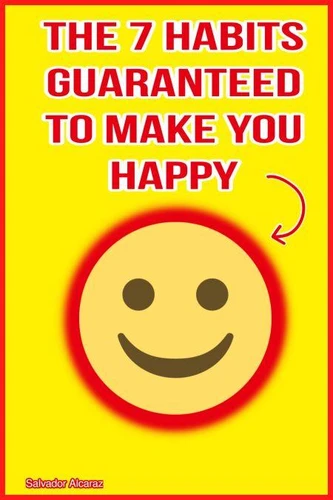The 7 Habits Guaranteed to Make You Happy
Par :Formats :
Disponible dans votre compte client Decitre ou Furet du Nord dès validation de votre commande. Le format ePub est :
- Compatible avec une lecture sur My Vivlio (smartphone, tablette, ordinateur)
- Compatible avec une lecture sur liseuses Vivlio
- Pour les liseuses autres que Vivlio, vous devez utiliser le logiciel Adobe Digital Edition. Non compatible avec la lecture sur les liseuses Kindle, Remarkable et Sony
 , qui est-ce ?
, qui est-ce ?Notre partenaire de plateforme de lecture numérique où vous retrouverez l'ensemble de vos ebooks gratuitement
Pour en savoir plus sur nos ebooks, consultez notre aide en ligne ici
- FormatePub
- ISBN8223783114
- EAN9798223783114
- Date de parution18/11/2023
- Protection num.pas de protection
- Infos supplémentairesepub
- ÉditeurDraft2Digital
Résumé
IntroductionAre you happy?To be honest, there is a good chance that you're not. A recent poll sponsored by Time Magazine stated that, only one in three Americans said that they were happy in their lives. That's not very good odds. In fact, it is downright discouraging. So, what has happened to us? It states right in the Declaration of Independence that we should be pursuing, "life, liberty, and the pursuit of happiness." These three things are considered inalienable rights.
That's a fancy way of saying these things should not ever be taken away from any of us. What it's also saying is that more than two hundred years ago, it was clearly recognized by some rather important people that the pursuit of happiness is one of our most common desires. Even then, the theory wasn't new. If you go back a couple of thousand years, you'll find that even the Greek philosophers talked about happiness.
Plato, Aristotle, and Socrates all had plenty to say on the subject. Lesser known but equally important scholars from all over the world did as wellWhen reading this book, take to heart this quote from Gautama Buddha, written about 500 B. C.: "There is no path to happiness: happiness is the path."
That's a fancy way of saying these things should not ever be taken away from any of us. What it's also saying is that more than two hundred years ago, it was clearly recognized by some rather important people that the pursuit of happiness is one of our most common desires. Even then, the theory wasn't new. If you go back a couple of thousand years, you'll find that even the Greek philosophers talked about happiness.
Plato, Aristotle, and Socrates all had plenty to say on the subject. Lesser known but equally important scholars from all over the world did as wellWhen reading this book, take to heart this quote from Gautama Buddha, written about 500 B. C.: "There is no path to happiness: happiness is the path."
IntroductionAre you happy?To be honest, there is a good chance that you're not. A recent poll sponsored by Time Magazine stated that, only one in three Americans said that they were happy in their lives. That's not very good odds. In fact, it is downright discouraging. So, what has happened to us? It states right in the Declaration of Independence that we should be pursuing, "life, liberty, and the pursuit of happiness." These three things are considered inalienable rights.
That's a fancy way of saying these things should not ever be taken away from any of us. What it's also saying is that more than two hundred years ago, it was clearly recognized by some rather important people that the pursuit of happiness is one of our most common desires. Even then, the theory wasn't new. If you go back a couple of thousand years, you'll find that even the Greek philosophers talked about happiness.
Plato, Aristotle, and Socrates all had plenty to say on the subject. Lesser known but equally important scholars from all over the world did as wellWhen reading this book, take to heart this quote from Gautama Buddha, written about 500 B. C.: "There is no path to happiness: happiness is the path."
That's a fancy way of saying these things should not ever be taken away from any of us. What it's also saying is that more than two hundred years ago, it was clearly recognized by some rather important people that the pursuit of happiness is one of our most common desires. Even then, the theory wasn't new. If you go back a couple of thousand years, you'll find that even the Greek philosophers talked about happiness.
Plato, Aristotle, and Socrates all had plenty to say on the subject. Lesser known but equally important scholars from all over the world did as wellWhen reading this book, take to heart this quote from Gautama Buddha, written about 500 B. C.: "There is no path to happiness: happiness is the path."






















